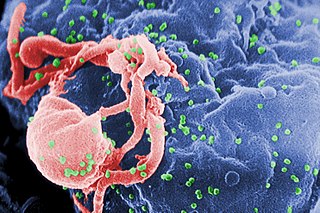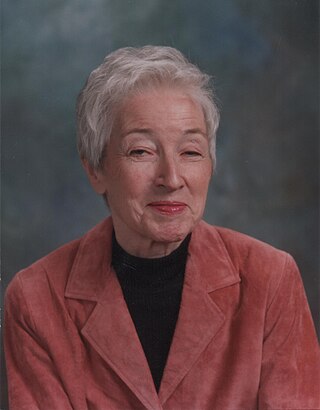
David Da-i Ho is a Taiwanese-American AIDS researcher, physician and virologist who has made a number of scientific contributions to the understanding and treatment of HIV infection. He championed combination anti-retroviral therapy instead of single therapy, which turned HIV from an absolute terminal disease into a chronic disease.

The Children's Hospital of Philadelphia, also known by its acronym CHOP, is a children's hospital in Philadelphia, Pennsylvania. Its primary campus is located in the University City neighborhood of West Philadelphia on the campus of the University of Pennsylvania. The hospital has 594 beds and more than one million outpatient and inpatient visits annually. It is one of the world's largest and oldest children's hospitals and the first hospital in the United States dedicated to the healthcare of children.
The National Institute of Allergy and Infectious Diseases is one of the 27 institutes and centers that make up the National Institutes of Health (NIH), an agency of the United States Department of Health and Human Services (HHS). NIAID's mission is to conduct basic and applied research to better understand, treat, and prevent infectious, immunologic, and allergic diseases.

Roswell Park Comprehensive Cancer Center is a cancer research and treatment center located in Buffalo, New York. Founded by surgeon Roswell Park in 1898, the center was the first in the United States to specifically focus on cancer research. The center is usually called Roswell Park in short. The center, which conducts clinical research on cancer as well as the development new drugs, provides advanced treatment for all forms of adult and pediatric cancer, and serves as a member of the National Comprehensive Cancer Network. Roswell Park Comprehensive Cancer Center is as of 2019, the only upstate New York facility to hold the National Cancer Institute designation of "comprehensive cancer center".

The Elizabeth Glaser Pediatric AIDS Foundation (EGPAF) is a nonprofit organization dedicated to preventing pediatric HIV infection and eliminating pediatric AIDS through research, advocacy, and prevention and treatment programs. Founded in 1988, the organization works in 12 countries around the world.

Stanley Alan Plotkin is an American physician who works as a consultant to vaccine manufacturers, such as Sanofi Pasteur, as well as biotechnology firms, non-profits and governments. In the 1960s, he played a pivotal role in discovery of a vaccine against rubella virus while working at Wistar Institute in Philadelphia. Plotkin was a member of Wistar’s active research faculty from 1960 to 1991. Today, in addition to his emeritus appointment at Wistar, he is emeritus professor of Pediatrics at the University of Pennsylvania. His book, Vaccines, is the standard reference on the subject. He is an editor with Clinical and Vaccine Immunology, which is published by the American Society for Microbiology in Washington, D.C.

The Miller School of Medicine, officially Leonard M. Miller School of Medicine, is the University of Miami's graduate medical school in Miami, Florida. Founded in 1952, it is the oldest medical school in the state of Florida.

ICDDR,B is an international health research organisation located in Dhaka, Bangladesh. Dedicated to saving lives through research and treatment, ICDDR,B addresses some of the most critical health concerns facing the world today, ranging from improving neonatal survival to HIV/AIDS. In collaboration with academic and research institutions worldwide, ICDDR,B conducts research, training and extension activities, as well as programme-based initiatives, to develop and share knowledge for global lifesaving solutions.

PATH is an international, nonprofit global health organization. PATH is based in Seattle with 1,600 employees in more than 70 countries around the world. Its president and CEO is Nikolaj Gilbert, who is also the Managing Director and CEO of Foundations for Appropriate Technologies in Health (FATH), PATH's Swiss subsidiary. PATH focuses on six platforms: vaccines, drugs, diagnostics, devices, system, and service innovations.

Nationwide Children's Hospital is a nationally ranked pediatric acute care teaching hospital located in the Southern Orchards neighborhood of Columbus, Ohio. The hospital has 673 pediatric beds and is affiliated with the Ohio State University College of Medicine. The hospital provides comprehensive pediatric specialties and subspecialties to infants, children, teens, and young adults aged 0–21 throughout Ohio and surrounding regions. Nationwide Children's Hospital also sometimes treats adults that require pediatric care. Nationwide Children's Hospital also features an ACS-verified Level 1 Pediatric Trauma Center, one of four in the state. The hospital has affiliations with the nearby Ohio State University Wexner Medical Center. Nationwide Children's Hospital is located on its own campus and has more than 1,379 medical staff members and over 11,909 total employees.

Children's Hospital Oakland Research Institute (CHORI) is a biomedical research institute affiliated with California’s pediatric medical center, UCSF Benioff Children's Hospital Oakland.
The Pollin Prize for Pediatric Research was an annual award given to physicians who contributed important advances to the field of pediatrics, and was the only existing international pediatric award. The prize was created in 2002 by Irene and Abe Pollin, and funded by the Linda and Kenneth Pollin Foundation. It was administered by the NewYork-Presbyterian Hospital, and as of 2003, Dr. Rudolph Leibel was chairman of the selection panel.
The United States Military HIV Research Program was initiated by the United States Congress in 1986, in reaction to the threat of lost effectiveness of U.S./Allied troops due to HIV infection. The mission of MHRP is to develop an HIV-1 vaccine, provide prevention, care, and treatment, and conduct meaningful HIV/AIDS research for the global community through the President's Emergency Plan for AIDS Relief (PEPFAR). It is centered at the Walter Reed Army Institute of Research (WRAIR), and has established five international research sites in Africa and Asia. MHRP also partners with the Armed Forces Research Institute of Medical Sciences (AFRIMS) in Thailand. MHRP works closely with The Henry M. Jackson Foundation for the Advancement of Military Medicine (HJF), most notably in the development of the RV144 HIV vaccine in Thailand. MHRP is the largest research program supported by the HJF.

Richard Alan Cash was an American global health researcher, public health physician, and internist. He was a pioneer of oral rehydration therapy for lethal diseases such as cholera. This simple, practical therapy is estimated to have saved over 50 million lives since.
Arthur J. Ammann was an American pediatric immunologist and advocate known for his research on HIV transmission, discovering in utero transmission and the risk of contaminated transfusions and blood products, and his role in the development of the first successful vaccine to prevent pneumococcal infection in 1977. He founded Global Strategies for HIV Prevention and was Clinical Professor of Pediatrics at the UCSF Medical Center.

HIV/AIDS research includes all medical research that attempts to prevent, treat, or cure HIV/AIDS, as well as fundamental research about the nature of HIV as an infectious agent and AIDS as the disease caused by HIV.

Jeanne Marie Lusher, M.D. was an American physician, pediatric hematologist/oncologist, and a researcher in the field of bleeding disorders of childhood, and has served as the director of Hemostasis Program at the Children's Hospital of Michigan until her retirement on June 28, 2013.
Deborah Persaud is a Guyanese-born American virologist who primarily works on HIV/AIDS at Johns Hopkins Children's Center.

Lauren V. Wood is an American allergist, immunologist, and staff physician at the National Cancer Institute (NCI) at the National Institutes of Health (NIH) in Bethesda, Maryland, where she has served as a principal investigator. She is known for conducting studies of vaccines for cancer, Human papillomavirus (HPV), Hepatitis C, and HIV especially for use with children, teens and young adults. She holds the rank of captain in the U.S. Public Health Service (PHS).

Mark W. Kline is an American pediatrician and infectious diseases specialist who currently serves as the Physician-in-Chief, Senior Vice President and Chief Medical Officer at Children's Hospital New Orleans and Professor of Pediatrics at the Tulane University School of Medicine and LSU Health New Orleans. Kline is known for his life-long work in building programs for children with HIV/AIDS all over the world.
















